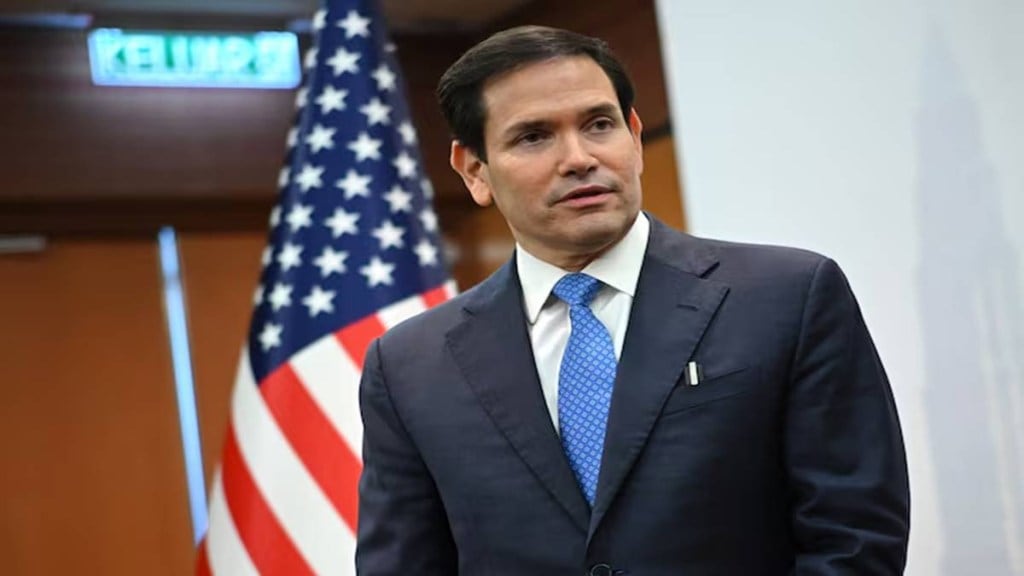Middle East crisis: US Secretary of State Marco Rubio will arrive in Israel on Sunday at a moment of growing strain between Washington and Tel Aviv. His visit comes as President Donald Trump has expressed frustration over Prime Minister Benjamin Netanyahu’s relentless push against Hamas, which critics say is prolonging the nearly three-year conflict in Gaza.
The immediate backdrop is Israel’s looming offensive in Gaza City and the fallout from a dramatic airstrike in Qatar targeting Hamas officials. Trump publicly rebuked the move, saying it “does not advance Israel or America’s goals”, signalling unease with Netanyahu’s strategy.
Before his departure for Israel, Rubio acknowledged Washington’s displeasure over Israel’s recent strike in Qatar, which targeted Hamas officials. “What’s happened, has happened,” he told reporters. “We’re gonna meet with them. We’re gonna talk about what the future holds.” His trip comes ahead of high-level UN meetings in New York, where France, Britain and other countries are expected to recognise Palestinian statehood.
Rubio stressed that America’s relationship with Israel remained firm, but added that discussions would centre on how the strike affected President Donald Trump’s efforts to secure the release of remaining hostages, dismantle Hamas and end the Gaza war. “There are still 48 hostages that deserve to be released immediately, all at once,” Rubio said.
He also highlighted the enormous challenges that lie beyond the conflict. Rebuilding Gaza, he said, would be essential for long-term stability, but questions remained over “who would do that, who would pay for it and who would be in charge of the process.”
Trump’s wants ceasefire soon
Trump has repeatedly promised to end the Gaza war and tabled a new ceasefire proposal earlier this month, which he claimed Israel had accepted. Yet fighting has continued unabated, with Israel blaming Hamas for negotiating in bad faith and Netanyahu’s critics accusing him of prioritising the destruction of Hamas over the release of Israeli hostages.
Rubio’s agenda, according to the State Department, will centre on Israel’s “goals and objectives” for the Gaza City offensive. While Mr Trump has not opposed the operation outright, analysts believe Rubio may push for it to be swift, opening the door to political negotiations that Trump hopes will bolster his legacy as a peace broker.
International fallout from Qatar strike
The Israeli strike in Doha has triggered condemnation abroad, with France, Germany and Britain calling it a breach of Qatar’s sovereignty and a blow to peace efforts. Qatar is a close US partner and hosts a major American air base, raising questions over whether Rubio will raise the issue directly with Israeli officials.
Despite such tactical differences, observers note that the Trump administration remains broadly aligned with Netanyahu’s hard-line government, particularly in opposing recognition of a Palestinian state. The State Department confirmed that Rubio will reiterate Washington’s opposition to “unilateral recognition of a Palestinian state that rewards Hamas terrorism”.
Calls for Palestinian statehood
Meanwhile, momentum for Palestinian recognition is growing in Western capitals. France and Canada have pledged to back statehood recognition at the UN General Assembly this month, a move that Israeli officials denounce as rewarding violence. Trump officials, too, have strongly opposed the step, despite former Secretary of State Antony Blinken recently arguing that recognition was “morally right” though premature.
Netanyahu has struck a defiant tone. At a recent ceremony for new settlements in the West Bank, he vowed there would “never” be a Palestinian state, underscoring the widening gulf between Israel and its allies.
Abraham Accords under strain
Rubio’s visit coincides with the fifth anniversary of the Abraham Accords, Trump’s signature diplomatic achievement that normalised ties between Israel and several Arab states. But Arab officials now warn that Netanyahu’s actions, coupled with talk of West Bank annexation, risk unravelling the agreements. A senior Emirati official recently cautioned that annexation would be a “red line” that could spell the end of regional integration.
For Trump, preserving the accords and extending them to Saudi Arabia remains a top foreign-policy ambition. Yet analysts warn that instead of expansion, the accords themselves may be at risk. As one former State Department adviser noted, “We’re entering an escalatory phase right now, and there’s no off ramp.”
Following his visit to Israel, Rubio will accompany President Trump on his upcoming trip to Britain next week.
(With inputs from agencies)

